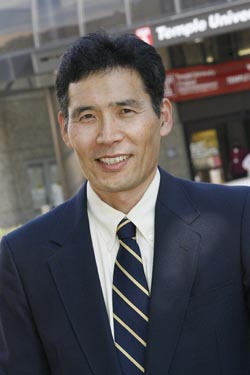Just for fun
|
It’s well known that those who suffer from mental illness can benefit greatly from an active lifestyle. But most of the existing research focuses almost solely on physical activity, and while exercise is certainly important for mind and body, Temple researcher Yoshitaka Iwasaki says it’s not the only aspect of an active lifestyle. “Living actively encompasses social, emotional, spiritual and cultural features of life as well,” he said. “Active living is also defined within the ways people express themselves, interact with others and find meanings of life by actively pursuing leisure that is valued by and important for them.” That’s why Iwasaki and co-principal investigators Kathy Coyle and John Shank, all professors of therapeutic recreation at the College of Health Professions, will study how those recovering from mental illness can benefit from actively engaged leisure. The project is supported by a two-year grant of more than $412,000 from the National Institutes of Health. Iwasaki says examples of actively engaged leisure can range from practicing Tai-Chi, to doing things with friends, to playing music or dancing, and the research team will focus particularly on this as a context for promoting recovery, health and life quality among members of diverse, urban communities. |
 Iwasaki
|
|
He distinguishes actively engaged leisure as a key part of active living, and one that focuses more on a person’s enjoyment, meaningfulness and enrichment than their level of physical activity. “For example, when a person regularly walks only for a health reason without experiencing enjoyment and good feelings, and without gaining meaningful and enriching experiences, she or he is not experiencing leisure,” he said. The team will work directly within the community to learn about the experiences of African, Hispanic, Asian, and Caucasian Americans living with mental illness and, based on those wants and needs, develop a program to promote actively engaged leisure grounded in social, cultural, and environmental systems as a way to support mental health and well-being. “Unfortunately, the existing mental health system does not appropriately meet the unique needs of culturally diverse groups of Americans — such as those residing in urban areas — living with mental illness, especially their needs to pursue actively engaged and meaningful living in their community,” said Iwasaki. The community-centric method that Iwasaki and his team use, called Community-Based Participatory Research (CBPR), is unique in that it is conducted as a partnership between academics and members of a community, who share and participate equally in all aspects of the research process — from resources, to results, to credit. Iwasaki says that the research team will draw on the expertise of mental health personnel working within these communities to create programs that are based on the everyday experiences of community members living with mental illness. Other researchers on the study are David Baron from Temple University; Mark Salzer of the University of Pennsylvania; Glenn Koons of the National Alliance on Mental Illness; Lynda Mitchell of RecCare: Recreational Therapy Support Services; and Andrea Ryan, the Philadelphia community representative for persons with mental illness. |
|